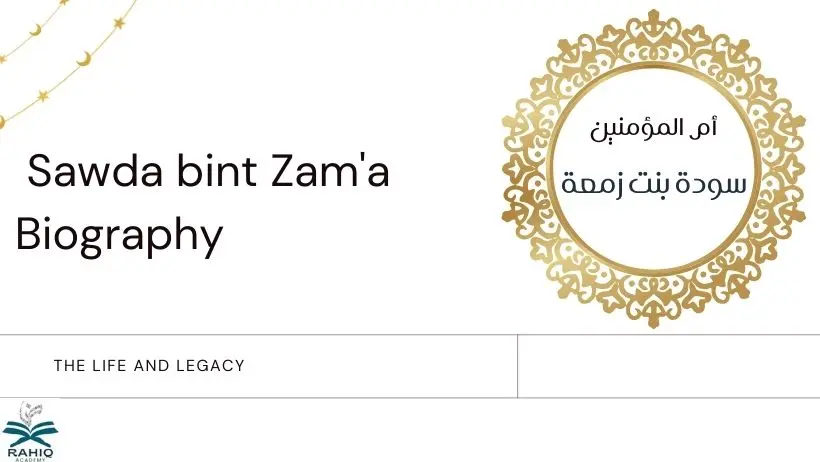Sawda bint Zam’a (may Allah be pleased with her) was one of the beloved wives of the Prophet Muhammad ﷺ, known for her resilience, faith, and dedication. As an early convert and a devoted companion, her story is filled with lessons of loyalty, selflessness, and strength.
sawda bint zam’a biography covers her early life, her marriage to the Prophet ﷺ, and her impactful role in Islamic history, revealing how her journey remains an inspiration for Muslims today.
Sawda bint Zam’a Life
Sawda bint Zam’a was born into the Qurayshi tribe of Banu Amir in Makkah, a tribe known for its noble lineage. She married her cousin, As-Sakran ibn Amr, and together they embraced Islam early in its propagation. During this time, Makkah was a challenging place for Muslims, as the Quraysh tribes worked to suppress the new message of Islam through intimidation and hostility.
In pursuit of religious freedom, Sawda and her husband migrated to Abyssinia (modern-day Ethiopia) along with other Muslims. Abyssinia was a safe haven where Muslims could freely practice Islam under the protection of King Najashi, a just Christian ruler.
After some time, however, Sawda and her husband returned to Makkah, where her husband passed away. She endured this period of grief with remarkable strength, placing her trust in Allah. As a widow with few support systems, she exemplified the resilience that would later mark her role as the Prophet’s ﷺ wife.
Sawda bint Zam’a Marriage
Following the passing of Khadijah bint Khuwaylid (may Allah be pleased with her), the Prophet ﷺ found himself grieving the loss of his beloved wife, who had been his primary source of support and comfort. Left with the responsibility of raising his daughters, he needed companionship and stability. A close family friend, Khawlah bint Hakim, suggested Sawda as a potential wife, noting her kindness, faith, and loyalty to the Muslim community.
The Prophet ﷺ accepted this proposal, and he and Sawda were soon married. Sawda brought a gentle, nurturing presence to his home, supporting him during a period of profound sorrow. She became a beloved mother figure to his daughters, particularly his youngest, Fatimah (may Allah be pleased with her), who was still quite young at the time. Known for her humor and compassion, Sawda uplifted the household with her joyful presence.
Later, when the Prophet ﷺ married Aisha bint Abu Bakr (may Allah be pleased with her), Sawda displayed a profound act of generosity. Understanding the importance of the new bond, she willingly offered her nights with the Prophet ﷺ to Aisha, showing her selflessness and the love she held for the Prophet’s ﷺ family. Sawda’s actions exemplify the concept of sacrifice for the greater good, underscoring her dedication to the Prophet’s ﷺ happiness and mission.
Reason of Marriage

The marriage between Sawda and the Prophet ﷺ reflects important Islamic values of compassion, mutual care, and the elevation of those in vulnerable situations. The Prophet ﷺ was mindful of the community’s needs and often emphasized the importance of caring for widows and orphans. Sawda, who was both a widow and a devoted believer, was provided with companionship, security, and a role of honor within the household of the Prophet ﷺ.
This marriage not only provided Sawda with a new sense of purpose but also highlighted the Prophet’s ﷺ commitment to supporting those who were disadvantaged.
Allah underscores the significance of caring for others in the Quran:
وَيَسْأَلُونَكَ مَاذَا يُنْفِقُونَ ۖ قُلْ مَا أَنْفَقْتُمْ مِنْ خَيْرٍ فَلِلْوَالِدَيْنِ وَالْأَقْرَبِينَ وَالْيَتَامَىٰ وَالْمَسَاكِينِ وَابْنِ السَّبِيلِ ۗ وَمَا تَفْعَلُوا مِنْ خَيْرٍ فَإِنَّ اللَّهَ بِهِ عَلِيمٌ
“They ask you what they should spend. Say, ‘Whatever you spend of good is for parents and relatives and orphans and the needy and the traveler. And whatever you do of good – indeed, Allah is Knowing of it”
(Surah Al-Baqarah, 2:215)
Through this marriage, the Prophet ﷺ demonstrated a commitment to building a family on the principles of kindness, respect, and mutual support. He provided Sawda with love and security, and in return, she offered him loyalty and unwavering devotion to his mission.
Sawda bint Zam’a Death
After the passing of the Prophet ﷺ, Sawda bint Zam’a continued to live a life marked by humility, faith, and generosity. She remained committed to the principles of charity, often giving away her belongings to help those in need. Sawda was known for her gentle nature and kind heart, embodying the characteristics of a true believer.
Sawda bint Zam’a death is believed to have occurred during the caliphate of Umar ibn Al-Khattab (may Allah be pleased with him), around 22 AH (644 CE).
Her life and character serve as a powerful reminder of the virtues of patience and selflessness, inspiring Muslims to live in service to others and to trust in Allah in all circumstances. As Allah mentions in the Quran:
وَالصَّابِرِينَ فِي الْبَأْسَاءِ وَالضَّرَّاءِ وَحِينَ الْبَأْسِ ۗ أُولَٰئِكَ الَّذِينَ صَدَقُوا وَأُولَٰئِكَ هُمُ الْمُتَّقُونَ
“And the patient in poverty and hardship and during battle. Those are the ones who have been true, and it is those who are the righteous”
(Surah Al-Baqarah, 2:177)
Conclusion
The story of Sawda bint Zam’a is one of faith, resilience, and dedication to Allah. Her marriage to the Prophet Muhammadﷺ showcases the values of compassion, mutual respect, and support that are at the heart of Islamic teachings. Sawda exemplified patience, selflessness, and generosity, leaving a lasting impact on the Muslim community as a mother of the believers.
At RAHIQ Academy, we believe that exploring the lives of figures like Sawda bint Zam’a can inspire and guide Muslims in their journey of faith.
By learning about the companions of the Prophet ﷺ, we can draw closer to understanding the values that form the foundation of Islam.
Join us at RAHIQ Academy as we explore the lives of these extraordinary individuals, fostering a deeper connection with our rich Islamic heritage.
May Allah grant us the strength to follow in the footsteps of Sawda bint Zam’a and the other noble companions, embodying the qualities of kindness, patience, and unwavering faith in our own lives.




